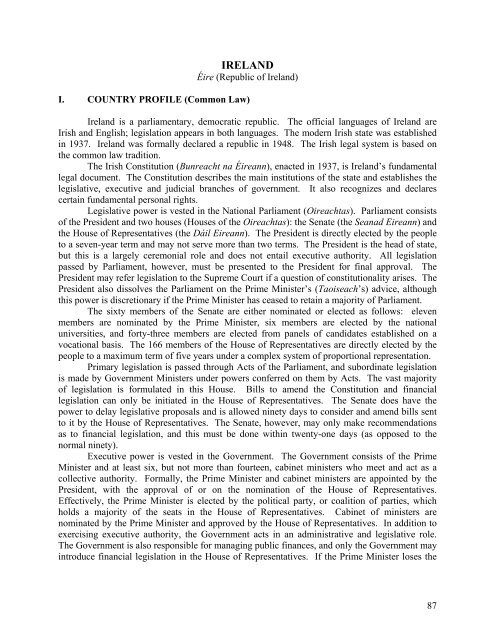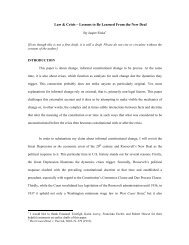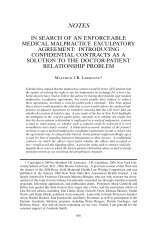Guide to Foreign and International Legal Citations - New York ...
Guide to Foreign and International Legal Citations - New York ...
Guide to Foreign and International Legal Citations - New York ...
You also want an ePaper? Increase the reach of your titles
YUMPU automatically turns print PDFs into web optimized ePapers that Google loves.
IRELAND<br />
Éire (Republic of Irel<strong>and</strong>)<br />
I. COUNTRY PROFILE (Common Law)<br />
Irel<strong>and</strong> is a parliamentary, democratic republic. The official languages of Irel<strong>and</strong> are<br />
Irish <strong>and</strong> English; legislation appears in both languages. The modern Irish state was established<br />
in 1937. Irel<strong>and</strong> was formally declared a republic in 1948. The Irish legal system is based on<br />
the common law tradition.<br />
The Irish Constitution (Bunreacht na Éireann), enacted in 1937, is Irel<strong>and</strong>’s fundamental<br />
legal document. The Constitution describes the main institutions of the state <strong>and</strong> establishes the<br />
legislative, executive <strong>and</strong> judicial branches of government. It also recognizes <strong>and</strong> declares<br />
certain fundamental personal rights.<br />
Legislative power is vested in the National Parliament (Oireachtas). Parliament consists<br />
of the President <strong>and</strong> two houses (Houses of the Oireachtas): the Senate (the Seanad Eireann) <strong>and</strong><br />
the House of Representatives (the Dáil Eireann). The President is directly elected by the people<br />
<strong>to</strong> a seven-year term <strong>and</strong> may not serve more than two terms. The President is the head of state,<br />
but this is a largely ceremonial role <strong>and</strong> does not entail executive authority. All legislation<br />
passed by Parliament, however, must be presented <strong>to</strong> the President for final approval. The<br />
President may refer legislation <strong>to</strong> the Supreme Court if a question of constitutionality arises. The<br />
President also dissolves the Parliament on the Prime Minister’s (Taoiseach’s) advice, although<br />
this power is discretionary if the Prime Minister has ceased <strong>to</strong> retain a majority of Parliament.<br />
The sixty members of the Senate are either nominated or elected as follows: eleven<br />
members are nominated by the Prime Minister, six members are elected by the national<br />
universities, <strong>and</strong> forty-three members are elected from panels of c<strong>and</strong>idates established on a<br />
vocational basis. The 166 members of the House of Representatives are directly elected by the<br />
people <strong>to</strong> a maximum term of five years under a complex system of proportional representation.<br />
Primary legislation is passed through Acts of the Parliament, <strong>and</strong> subordinate legislation<br />
is made by Government Ministers under powers conferred on them by Acts. The vast majority<br />
of legislation is formulated in this House. Bills <strong>to</strong> amend the Constitution <strong>and</strong> financial<br />
legislation can only be initiated in the House of Representatives. The Senate does have the<br />
power <strong>to</strong> delay legislative proposals <strong>and</strong> is allowed ninety days <strong>to</strong> consider <strong>and</strong> amend bills sent<br />
<strong>to</strong> it by the House of Representatives. The Senate, however, may only make recommendations<br />
as <strong>to</strong> financial legislation, <strong>and</strong> this must be done within twenty-one days (as opposed <strong>to</strong> the<br />
normal ninety).<br />
Executive power is vested in the Government. The Government consists of the Prime<br />
Minister <strong>and</strong> at least six, but not more than fourteen, cabinet ministers who meet <strong>and</strong> act as a<br />
collective authority. Formally, the Prime Minister <strong>and</strong> cabinet ministers are appointed by the<br />
President, with the approval of or on the nomination of the House of Representatives.<br />
Effectively, the Prime Minister is elected by the political party, or coalition of parties, which<br />
holds a majority of the seats in the House of Representatives. Cabinet of ministers are<br />
nominated by the Prime Minister <strong>and</strong> approved by the House of Representatives. In addition <strong>to</strong><br />
exercising executive authority, the Government acts in an administrative <strong>and</strong> legislative role.<br />
The Government is also responsible for managing public finances, <strong>and</strong> only the Government may<br />
introduce financial legislation in the House of Representatives. If the Prime Minister loses the<br />
87
















